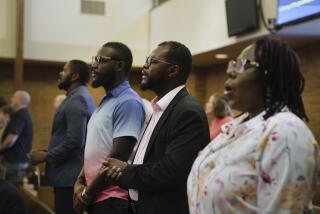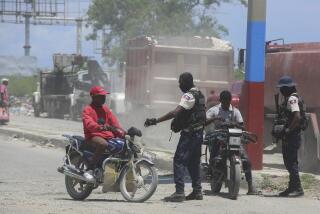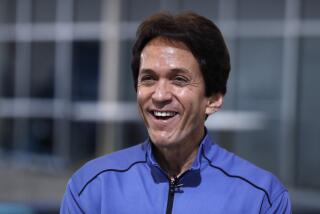10 Americans face child-kidnapping charges in Haiti
- Share via
Reporting from Port-Au-Prince, Haiti — The 10 Americans accused by Haiti of trying to sneak 33 children out of the earthquake-ravaged country were charged with child kidnapping and criminal association Thursday and returned to jail to await trial.
The Baptist missionaries from Idaho appeared before a judge who determined that there was sufficient evidence to proceed with criminal charges, said Edwin F. Coq Jr., one of their attorneys.
Coq described a somber scene inside the closed courtroom, adding that before the questioning began the group members bowed their heads and prayed together.
After the hearing, which ran more than two hours, policemen escorted the Americans, some of whom hid their faces beneath jackets, into a police vehicle.
Laura Silsby, 40, the organizer of the trip, sat silently, refusing to respond to questions shouted by reporters through the windows. Earlier, Silsby told reporters, “God wanted us to come here to help children; we are convinced of that.”
Many in the group attend Central Valley Baptist Church in Meridian, Idaho. The church strongly disputed the group’s portrayal by some in Haiti as would-be human traffickers looking to take advantage of the chaos that followed the earthquake.
The case has been prime fodder for Haitians and the hordes of international news media groups that descended on the impoverished Caribbean nation following the magnitude 7.0 earthquake Jan. 12 that is estimated to have killed more than 150,000 people.
Authorities on Jan. 29 stopped a bus carrying the 10 Americans and the children at the border between Haiti and the Dominican Republic. At the time, group members said the children were orphans and that the group’s intent was to provide them with shelter and care. They could not provide any official documents proving legal custody of the children, many of whom later were found not to be orphans.
The children, ranging in age from 2 to 12, this week were being cared for at a child-care center in Port-au-Prince.
Parents of some of the children from the badly damaged village of Callebas told the Associated Press that they willingly handed over their children to the Americans because they felt they were unable to care for them.
Coq said Haitian law allows prosecutors up to three months to prepare a case for trial. He reiterated earlier statements that only Silsby knew of the plan to take children out of the country and that the other nine should have been set free. He expressed confidence that Silsby and the others would eventually be cleared of the charges.
Each kidnapping count carries a possible sentence of five to 15 years in prison and each count of criminal association carries a sentence of three to nine years, according to news reports.
Coq also tamped down persistent speculation that the group would be transferred to the U.S. to face charges there, saying, “Right now, they are being fully tried in Haiti. It is up to the Haitian authorities to judge them.”
More to Read
Sign up for Essential California
The most important California stories and recommendations in your inbox every morning.
You may occasionally receive promotional content from the Los Angeles Times.











